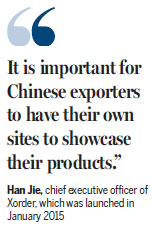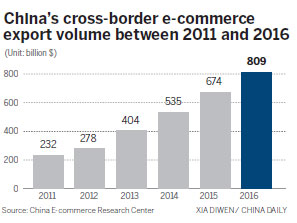Startup looks to help exporters build websites
Updated: 2016-09-02 09:01
By Meng Jing in Hangzhou(China Daily USA)
|
|||||||||
Despite being a startup, a Hangzhou-based digital marketing solutions provider is looking to help more traditional exporters build up their e-commerce empires.
Xorder (China) Technology, which is headquartered in the same city as e-commerce giant Alibaba Group, helps Chinese exporters set up their own websites in multiple languages, enabling them to directly communicate with their clients and streamline transactions.
"It is important for Chinese exporters to have their own sites to showcase their products, build up brand awareness and gather information and data on potential customers," said Han Jie, chief executive officer of Xorder, which was launched in January 2015.
Many of China's traditional exporters set up virtual stores on e-commerce platforms, such as Alibaba and DHgate, because they offer exposure to a huge number of sellers and buyers. However, with a crowded platform comes cut-throat price competition.

"After all, those clients who are attracted by your price will leave you because of a lower price," said Han, a veteran entrepreneur who began set-ting up his own business in 2000.
While being on an established e-commerce platform is an easy way to attract new customers, a separate website helps exporters retain existing customers, especially when there is a focus on quality rather than price to win overseas market share, said Han.
Xorder now has about 100 clients - all exporters with annual sales between $1 mil-lion and $50 million.
Han said the company, which has 25 employees, has already broken even and is expected to turn a profit later this year.
"With the improving infra-structure in cross-border e-commerce, such as the increasingly high penetration rate of digital payments, the market for business-to-business cross-border e-commerce will soon take off," he said.
According to a report released in early August by Hangzhou-based China E-commerce Research Center, about 84 percent of online export volume was made via the business-to-business model.
Zhang Zhouping, senior analyst with the center, said such exports will continue to comprise the majority of China's cross-border commerce.
"With the challenging situation faced by traditional exports in China, the Chinese government has taken a lot of measures to smooth the process of e-commerce enabled exports and encourage exports moving from offline to online," he said.
China's traditional exports declined 1.8 percent year-on-year to 14.14 trillion yuan ($ 2.12 trillion) last year, but the exports made via e-commerce channels jumped 26 percent to 4.5 trillion yuan in the same period, according to government figures.

(China Daily USA 09/02/2016 page9)
- Rousseff appeals impeachment to Supreme Court
- Europeans displeased with their education systems
- Singapore Zika cases top 150; China steps up arrivals checks
- Artists respond to 9/11 attacks in new exhibit
- Rocket explodes on launch pad in blow to Elon Musk's SpaceX
- Record number of Americans dislike Hillary Clinton: poll

 Commemorative G20 stamps a hit at media center
Commemorative G20 stamps a hit at media center
 Ten photos from around China: Aug 26- Sept 1
Ten photos from around China: Aug 26- Sept 1
 Hangzhou: Paradise for connoisseurs of tea
Hangzhou: Paradise for connoisseurs of tea
 Top 10 trends in China's internet development
Top 10 trends in China's internet development
 Childhood captured in raw, emotive black and white
Childhood captured in raw, emotive black and white
 Korean ethnic dance drama shines in Beijing
Korean ethnic dance drama shines in Beijing
 Children explore science and technology at museum
Children explore science and technology at museum
 Children wearing Hanfu attend writing ceremony
Children wearing Hanfu attend writing ceremony
Most Viewed
Editor's Picks

|

|

|

|

|

|
Today's Top News
Trump outlines anti-terror plan, proposing extreme vetting for immigrants
Phelps puts spotlight on cupping
US launches airstrikes against IS targets in Libya's Sirte
Ministry slams US-Korean THAAD deployment
Two police officers shot at protest in Dallas
Abe's blame game reveals his policies failing to get results
Ending wildlife trafficking must be policy priority in Asia
Effects of supply-side reform take time to be seen
US Weekly

|

|









